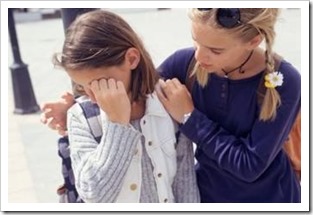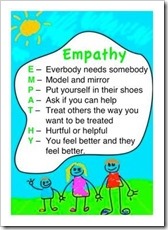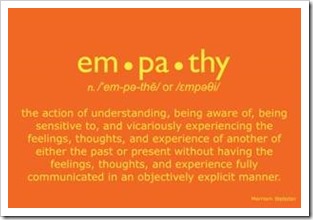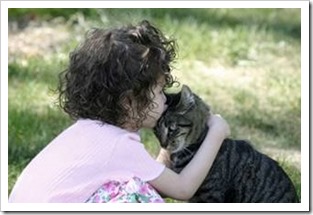
Empathy is a very important emotional skill. As parents and teachers, it’s our role to teach our children empathy. Although some people have a natural tendency to be more understanding and empathetic toward others, our role is to promote empathy in all children.
Regardless of their natural starting point, children can all improve their ability to put themselves in another person’s shoes. This will help them build better relationships.
A person’s level of empathy can tell us a lot about a person’s emotional intelligence. If they are more empathetic, they’re usually more confident. If you can be empathetic, it usually means you feel good enough about yourself to be able to share it with others.
Here are some things to remember about empathy.
- Empathy develops at a very early age, thorough modeling. Modeling uses a mechanism in the brain called neuro-mirroring. What happens in the brain is that it recreates the action of the person we’re watching, and we therefore feel what they’re feeling. This is how we naturally develop empathy. If what we mirror is too overwhelming, the brain automatically shuts down/minimizes the mirroring to help us cope. Even though all this happens subconsciously, we can help our children develop positive empathy by choosing what to expose them to.

- One way of measuring empathy is to pay attention to the language a person uses. In the next post for this series, I will show you some examples of statements empathic and non empathic people use.
- It’s important to remember that it’s impossible to be empathic all the time. At certain times we can emotionally afford to be more empathic than others.
- Empathy sits on a scale. Some people show more empathy and some people show less. This is natural.
- The best way to teach empathy is to model empathy.
Although some of the empathy we can model is non verbal, verbal cues can give us a lot of insight into empathy. If you don’t hear your kids using empathic language, it’s simply because they haven’t heard it from the adults in their lives. Use empathic phrases more often if you want to hear them from your kids.
Use Your Words: The Language of Empathy
Empathy is an important social skill. Some people are more empathic than others and the language a person uses reveals a lot about their level of empathy. I would like to share some common emphatic and non emphatic statements that kids and grownups may use.

At the end, add up all the emphatic statements and all the non emphatic statements. Whichever has a higher number of points will show you what kind of sentences you’re using most often.
Here are some statements for you. I will give an example of empathy, and an example of non empathy for comparison.
- I feel sad/upset/hurt when I see another kid being hurt (empathy)
- He probably deserved the punishment he was given (non empathy)
Feeling sad, hurt or upset when watching others who are sad, hurt or upset is the ultimate display of empathy. Kids are more sensitive to the pain of those who are close to them, e.g. family, friends and even teachers. Parents are usually their most important models of empathy.
- I love watching people’s happy faces when they open presents (empathy)
- I don’t like watching others open presents (non empathy)
Being happy for others is a sign of empathy. Jealousy is usually the opposite. Being happy in others’ happiness is a sign of abundance in self-confidence, while jealousy comes from a position of lack.

- He is just a cry baby/I cannot stand hearing kids cry (not empathy)
- I feel sorry for kids in the play ground that have no one to play with (empathy)
- He/she can go play with her friends if she wants (non empathy).
Generally, the expression “feeling sorry for” is a sign of empathy. To feel sorry for someone requires putting yourself in their shoes. Examples include, being sorry for other kids abilities (or disabilities), possessions (or lack thereof), living conditions, social status, opportunities, etc.
- Some songs/TV shows/movies make me want to cry (empathy)
- It is just a silly song/TV show/ movie (non empathy)
- I can understand his/her point of view (empathy)
- It was such a stupid thing to do/say or why on earth would he do/say that? (non empathy).
Acceptance and consideration
The ability to understand that different people have different points of view is a very healthy ability. An inability to do that can bring judgment and attract conflict.
- In an argument, I try not to hurt the other person’s feelings/I try to imagine who they must be feeling (empathy)
- In an argument, I say exactly what I think and if the other person is hurt, that is just too bad. It is their problem (non empathy)
Trying to be considerate, regardless whether it is successful or not, is a sign that you considered another person’s feelings. Those who say what they want without considering others feelings usually get into more conflicts and have more relationships troubles.
Consideration toward others is evident by: coming on time to a meeting, respecting others’ possessions, feelings or relationships. Less empathic kids are more opinionated, blunt, judgmental and inflexible. They have a black or white mindset and they prefer to do things “by the book”.
- I can tell what my parents’ mood is by looking at their faces (empathy)
- I don’t have any idea what is happening in my parents’ minds. If they don’t tell me I cannot tell (non empathy)
- I can tell when it is a good time to ask my parents for something (empathy)
- I never know if I can ask them or not (non empathy)
The ability to predict what others will say or do is an intuitive function that is based on many subtle cues we’re not aware of. A kid who cannot tell when it is a good time to show their parents their failed exam or ask for permission for something they want is usually because their parents were inconsistent in their response.

- I don’t like practical jokes. It is not nice to make fun of someone (empathy)
- I enjoy practical jokes. It is really funny to see people in awkward situations (non empathy)
Kids and grownups who like making fun of others usually have less empathy. While humor can be important for social interaction, there is a clear distinction between cruelty and fun. A good way to distinguish between the two is to check which party thinks it is funny.
If both sides thought it was funny, then it is humor. If only one of them thinks it is funny, that is cruelty.
- It hurts me to see animal cruelty (empathy)
- I prefer animals to humans (non empathy)
Caring and flexibility
Rejecting cruelty is a sign of empathy. However, you might be surprised to know that preferring animals to humans is a sign of difficulty in “reading” other people. It indicates challenges in empathy.
Don’t get me wrong. A love of animals can be a wonderful thing. But some adults express such an extreme love of their pet, to that point that they risk their kids thinking they prefer their animals to their own kids.
- If I explain something and the other person cannot understand, I can try another explanation (empathy)
- I don’t understand how hard it is to understand what I am saying. They must be stupid if they cannot get it (non empathy)
Empathic kids are more flexible because they understand that others may be different to them. They will make more of an effort to explain themselves while non empathic kids can be very opinionated.
Non empathic kids are more focused on the topic at hand but they listen less, which makes it harder for them to understand why others don’t think and do things the same way as them. This mindset sometimes gets them into big relationship troubles.

- I don’t care about what is happening with others. If they want help, they can ask for it (non empathy)
Caring is a sign of empathy. Doing things for others, helping/supporting, volunteering time/ skills/money is a sign of a high level of empathy. Kids who don’t care are usually busy with their own feelings and emotions. It is usually a sign they don’t have “enough” of their own self confidence to give anything to others.
- I love being around other people and I am at my peak in social situation (empathy)
- I don’t fancy social interactions. I prefer to be on my own (non empathy)
Empathy goes hand in hand with social skills and a lack of it goes hand in hand anti social skills. Empathic kids value friendship and find social situations comfortable. Non empathic kids find social interactions very confusing and hard to explain.
When a child doesn’t benefit emotionally from a social situation, feels overwhelmed, or cannot predict how others will behave, social interactions become a burden. By helping them feel and display empathy, you change their social lives forever. They way to do this, is through modeling!
Happy and easy empathy modeling,
Ronit














